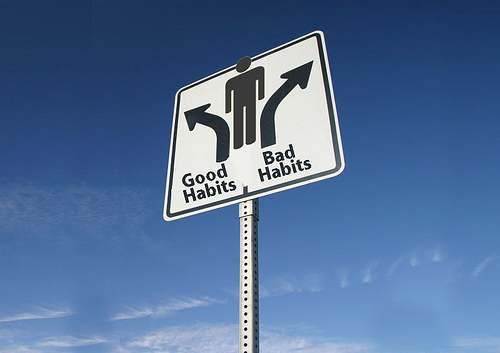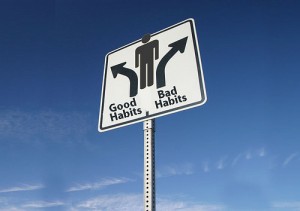Are Your Habits Helping or Hindering?


First we make our habits, and then our habits make us.
Every morning I start my day with a big cup of Earl Grey tea, milk and two sugars. It’s become a well-worn ritual that dates back to my days in high school. And while it may not be the most ideal kick-start to my day, it works for me.
So too does my habit of pouring myself a glass of wine most evenings around dinner time. It may not be the most ideal wind-down routine to my day but again, it works for me.
There’s nothing really wrong or right about either of these habits. They are, after all, just habits.
But it’s amazing how our habits can sneak up on us. And unsettling how easily we can fall victim to habits that we would never consciously choose to have. Like my other habit of checking my Blackberry too often. Yes, even at traffic lights. Only red ones 😉 These default patterns of behavior, repeated again and again, form a well-worn groove. And by the time we’ve realized they have taken residence in our lives, they can be like a squatter in an abandoned building. Obstinate about moving on out.
While it’s one of life’s cruelties that bad habits are easier to acquire and harder to ditch than good ones, it’s fallacy to think that you can’t change your habits. Of course it might be really difficult to quit smoking, running habitually late, pressing your foot too hard on the accelerator, drinking too much caffeine, pressing the snooze button until the last possible moment or finishing other people’s sentences, but that doesn’t mean you can’t. Research tells us that our brains are pliable and that we can develop new ways of thinking and behaving right up to the end of our lives. This innate neuro-plasticity means that you are never too old to change old habits. Believing that you can do that is the first, and most crucial, step in the process. (For more on neural-plasticity I highly recommend The Brain That Changes Itself: Stories of Personal Triumph from the Frontiers of Brain Science (James H. Silberman Books)by Dr. Norman Doidge)
Think about the most successful people around you and you will find they are generally very intentional about what they do (and don’t do) and very thoughtful about why they do it. They know that who they are is what they repeatedly do. Of course, that’s not to say they mightn’t have acquired some ‘not-so-good’ habits but that they have even more great ones. To quote Benjamin Franklin: “Your net worth to the world is usually determined by what remains after your bad habits are subtracted from your good ones.” Certainly those people I admire most have well-entrenched habits (practices and rituals) that help keep them mentally focused, emotionally resilient, physically fit and spiritually centered.
 My parents have a daily ritual of a morning cup of tea in bed (hmmm… maybe it’s genetic?) followed by reading from a prayer book and then praying together which includes naming each of their children and grandchildren. They’ve done it for years and every time I go home to stay with them, I find the familiarity of this morning ritual inspiring. I also love knowing that over 10,000 miles away on the other side of the world on a small farm in Australia my mum and dad are praying for me, my husband and four children. Who wouldn’t, right? (Here’s a picture of me with my parents toasting marshmellows around a bonfire taken while back in Australia in August.)
My parents have a daily ritual of a morning cup of tea in bed (hmmm… maybe it’s genetic?) followed by reading from a prayer book and then praying together which includes naming each of their children and grandchildren. They’ve done it for years and every time I go home to stay with them, I find the familiarity of this morning ritual inspiring. I also love knowing that over 10,000 miles away on the other side of the world on a small farm in Australia my mum and dad are praying for me, my husband and four children. Who wouldn’t, right? (Here’s a picture of me with my parents toasting marshmellows around a bonfire taken while back in Australia in August.)
Of course not all habits and rituals are about outward action (or lack thereof in the case of habitual procrastinators.) We can also develop habitual ways of thinking and processing our experiences in life that have a huge impact on our sense of well-being, relationships and experience of being alive. Some people have a habit of judging everyone around them very negatively. Others have habits of telling themselves that they are worthless, stupid or doomed to fail. Just yesterday I met a beautiful young woman who told me that she feels very unattractive and has developed a habit of assuming that people will think she is overweight. Having had an eating disorder in my teens and early 20s I know how rapidly adolescent self-consciousness can spiral into self-destructive habits of thought and eating behavior.
So I invite you to ask yourself these two questions. Honestly. And reflect on whether the habits they identify are one’s that could do with a little (or lot) attention.
- What do you repeatedly do, or fail to do, that doesn’t enhance your quality of life or does you an outright disservice?
- What do you repeatedly tell yourself that may be keeping you stuck, undermining your efforts to change those aspects of your life that aren’t as you’d like?
As I wrote in Find Your Courage: 12 Acts for Becoming Fearless at Work and in Life, people who often find themselves in a rut in any area of their life, who keep failing to achieve the result they’d like (whether in their relationships, fitness or finances) have developed habits in mind and behavior that are contributing to their circumstances. The quality of your experience of life is determined by the quality of your thinking.
In his book Learned Optimism: How to Change Your Mind and Your Life, Martin Seligman tells us that we can actually develop the habit of seeing the world through a more positive and optimistic lens. Because our thoughts determine our behavior, doing so leads us to taking actions that create new opportunities, forge new relationships and produce new (and improved!) results. The good news for you (and me!) is that while our bad habits may have shaped our lives in ways we don’t always like, we can, with courage and commitment, reshape our thinking and the behavior it directs in profound and positive ways.
Below are ten steps you can take to changing a habit from one that hinders to one that helps. But don’t just read it online, consider printing out a hard copy of these 10 tips so that you can refer to it again and again as you move forward in reshaping your habits and, with them, your life.
Ten Keys to Changing a Habit
- Start small. Changing habits can be hard. Trying to change more than one habit at once or make too big a change at once sets you up to fail. Not good. So do it one step, one habit, at a time. For instance, if you want to get fit, start with a 15 minute walk three days a week. Make it doable and then ramp up as you go along.
- Don’t just think it, INK IT! Simply saying to yourself that you are going to change a habit is not sufficient. You must write it down, on paper (with a non-erasable pen!). Make sure you include a) what specific habit you’re going to change, b) your reason for making the change (it needs to be compelling), and c) your plan for making the change (more to follow below).
- Set a 30-day challenge. How long it takes to change a habit depends on what the habit is and who you are. It takes a solid 30 days to develop a new habit (and lose an old one), longer again to have it become second nature. But start with 30 days and put a chart somewhere highly visible to track your progress. New habits take time to grow from cobwebs to cables.
- Don’t start right away. In your plan, write down a start date. Maybe a week or two from the date you start writing your plan. When you start right away (like the moment you finish reading this list), you are not giving the plan the seriousness it deserves. That said, don’t delay too long. Habits are harder to dislodge the longer they’re left.
- Identify your triggers. What situations trigger your current habit? Most habits have multiple triggers (from going to a bar to attending a stressful meeting) so you must prepare for them in advance. Write down how you plan to handle them including a positive habit you’re going to do instead. These could be going for a walk when you feel the urge to open the pantry door, meditating, deep breathing, de-cluttering, drinking a glass of water as you walk in the door at night (rather than reach for a beer), and the list goes on and on. Likewise, try to avoid situations where you normally do your old habit, at least for awhile, to make it a bit easier on yourself. If going out to a bar is a trigger to smoke, avoid bars for a while.
- Design your environment. When you surround yourself with people who believe in you, it makes success easier to achieve. Who will you turn to when you have a strong urge to return to the habitual behavior? Write these people into your plan and then ask for their support. Beyond those you already know, consider joining a support group or online forum. The more people who know about what you are doing, the more who can encourage you and hold you accountable. Likewise, be wary of those people around you who may feel threatened by you wanting to change your habit and take control of your life. Let them know that you need their support, not their cynicism. Tell them if they can’t support you then you would prefer not to spend time with them. Be deliberate about the people you spend time with and know that sometimes you need to let go of old friends in order to grow.
- Tune in to your self talk. You talk to yourself, in your head, all the time — but you may not be aware of these thoughts. Time to tune in! Thoughts like “I can’t do this. It’s too difficult. This habit’s really not that bad” have the potential to derail your efforts. So it’s crucial to notice when you’re having them, and then remind yourself that they don’t represent the part of you that yearns for change. When you catch yourself midstream in a negative thought, consciously replace it with a positive empowering one. “I can do this. My persistence will pay off. I am replacing this habit that hurts me with one that helps me.” Just as walking once along the earth doesn’t create a path, neither will once replacing a negative thought with a positive one permanently change your thinking. You have to stick at it and repeat those new thoughts again and again and again until a new path is forged and a new habit created.
- Harness the power of vision. Yes, it may seem new age-y but visualization is powerful. I invite you to let go any habitual cynicism and experiment with it with an open mind. In your mind’s eye create a vivid picture of yourself living with the new habits you are creating. Visualize doing your new habit after each trigger, overcoming urges, and what it will look like when you’re done. How are you feeling? How are you looking? How is life working better for you because of it? Utilize all of your senses to really embody that new you.
- Reward yourself. Regularly. You might see these as bribes, but they are actually what cognitive psychologists would call ‘positive reinforcers.’ Incorporate them into your plan, along with the milestones at which you’ll receive them.
- Cut yourself slack. You are not perfect. No one is. So it’s very possible that there will be times when you don’t keep your resolve and you slip back into old ways of thinking and doing. Don’t beat yourself up when this happens. Rather forgive yourself for being human, figure out what went amiss, plan for it in the future and then get back on your horse! Don’t give feelings of failure and guilt the power to stop you. Sometimes two steps forward, one step back. Such is life. Every step – even backward ones – provides an opportunity to learn more about yourself, to dig deeper into yourself and to step closer toward the full quota of the person you aspire to be. What matters most is not how fast you are moving, but the direction you are moving in… toward a happier and healthier you.


